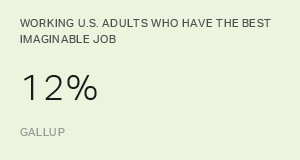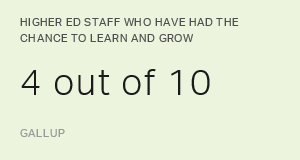Story Highlights
- 20% of law graduates strongly agree that their degree prepared them well
- Less than a quarter of MBA and law grads strongly agree they had a mentor
WASHINGTON, D.C. -- Masters of business administration (MBAs) and law degree graduates are less likely than other postgraduates to say their graduate degree prepared them well for life outside of graduate school and that it was worth the cost. Only two in 10 MBAs and law degree holders say their education prepared them well, while half of medical degree holders say the same.
Law graduates, in particular, rate the value of their degree poorly. Less than a quarter of law degree holders strongly agree that their education was worth the cost, compared with about six in 10 of those with medical (58%) or doctoral (64%) degrees.
| Doctoral Degree | Medical Degree | Law Degree | MBA | Master of Science | Master of Arts | ||||||||||||||||||||||||||||||||||||||||||||||||||||||||||||||||||||||||||||||||||||||||||||||
|---|---|---|---|---|---|---|---|---|---|---|---|---|---|---|---|---|---|---|---|---|---|---|---|---|---|---|---|---|---|---|---|---|---|---|---|---|---|---|---|---|---|---|---|---|---|---|---|---|---|---|---|---|---|---|---|---|---|---|---|---|---|---|---|---|---|---|---|---|---|---|---|---|---|---|---|---|---|---|---|---|---|---|---|---|---|---|---|---|---|---|---|---|---|---|---|---|---|---|---|
| % | % | % | % | % | % | ||||||||||||||||||||||||||||||||||||||||||||||||||||||||||||||||||||||||||||||||||||||||||||||
| My education from graduate school was worth the cost | 64 | 58 | 23 | 42 | 49 | 45 | |||||||||||||||||||||||||||||||||||||||||||||||||||||||||||||||||||||||||||||||||||||||||||||
| My graduate school prepared me well for life outside of graduate school | 30 | 50 | 20 | 23 | 30 | 24 | |||||||||||||||||||||||||||||||||||||||||||||||||||||||||||||||||||||||||||||||||||||||||||||
| Gallup-Purdue Index Postgraduate Degree Database | |||||||||||||||||||||||||||||||||||||||||||||||||||||||||||||||||||||||||||||||||||||||||||||||||||
While both medical and law degrees are expensive, law degree holders may be less likely to say their degree was worth the cost because of the weak job market for those with a law degree in recent years. Additionally, doctoral graduates may rate the value of their degree highly because many receive financial aid during their programs in the form of teaching and research assistantships.
These results come from the Gallup-Purdue Index nationally representative study of postgraduate degree holders in the U.S., which includes more than 4,000 adults who received a postgraduate degree between 2000 and 2015.
MBA, Law Degree Holders Less Likely to Have Had Key Experiences
Likely contributing to their lower ratings of their degrees, postgraduates who received MBAs and those who received law degrees are also less likely than other postgraduate degree holders to report having had important support and experiential learning opportunities during their graduate programs. For example, less than a quarter of MBA (19%) and JD (24%) holders strongly agree that their postgraduate professors cared about them as a person, compared with about a third of those with other graduate degrees -- including other master's, doctoral and medical degrees.
| Doctoral Degree | Medical Degree | Law Degree | MBA | Master of Science | Master of Arts | ||||||||||||||||||||||||||||||||||||||||||||||||||||||||||||||||||||||||||||||||||||||||||||||
|---|---|---|---|---|---|---|---|---|---|---|---|---|---|---|---|---|---|---|---|---|---|---|---|---|---|---|---|---|---|---|---|---|---|---|---|---|---|---|---|---|---|---|---|---|---|---|---|---|---|---|---|---|---|---|---|---|---|---|---|---|---|---|---|---|---|---|---|---|---|---|---|---|---|---|---|---|---|---|---|---|---|---|---|---|---|---|---|---|---|---|---|---|---|---|---|---|---|---|---|
| % | % | % | % | % | % | ||||||||||||||||||||||||||||||||||||||||||||||||||||||||||||||||||||||||||||||||||||||||||||||
| My professors cared about me as a person | 37 | 35 | 24 | 19 | 32 | 34 | |||||||||||||||||||||||||||||||||||||||||||||||||||||||||||||||||||||||||||||||||||||||||||||
| I had a mentor who encouraged me to pursue my goals and dreams | 49 | 54 | 19 | 14 | 27 | 29 | |||||||||||||||||||||||||||||||||||||||||||||||||||||||||||||||||||||||||||||||||||||||||||||
| I had a job or internship that allowed me to apply what I was learning in the classroom | 40 | 53 | 58 | 36 | 45 | 47 | |||||||||||||||||||||||||||||||||||||||||||||||||||||||||||||||||||||||||||||||||||||||||||||
| Gallup-Purdue Index Postgraduate Degree Database | |||||||||||||||||||||||||||||||||||||||||||||||||||||||||||||||||||||||||||||||||||||||||||||||||||
MBA and law graduates are also less likely to report having had a mentor during their graduate program who encouraged them to pursue their goals and dreams. While about half of those with medical (54%) or doctoral (49%) degrees strongly agree that they had this type of mentor during their program, only 14% of MBA grads and 19% of law graduates say the same.
Differences in mentorship may stem from the structure of these graduate programs. For example, doctoral students typically work closely with a faculty adviser and medical students often partner with other doctors during their residency programs as a specific design of their graduate education. Meanwhile, MBA and law school programs typically do not have these mentorship opportunities directly built into their programs.
MBA graduates also lacked the opportunity to apply what they were learning during their graduate programs. Slightly more than a third of MBA graduates (36%) strongly agree that they had a job or internship during their graduate program where they could apply what they were learning in the classroom. This compares with more than half of those with a medical (53%) or law (58%) degree.
Bottom Line
Previous research from the has found that bachelor's degree-holders who received support from faculty and staff and had the opportunity for experiential learning are more likely to have positive long-term outcomes, including higher well-being and workplace engagement. College graduates who had these types of experiences are also more likely to value their degree and feel as though their school prepared them to succeed.
However, these types of supportive experiences and experiential learning opportunities also appear to be critical during postgraduate education. Postgraduate programs whose graduates are most likely to say they had a mentor, that their professors cared about them and that they had the opportunity to apply what they were learning are typically the most likely to say their school prepared them well and that their degree was worth the cost.
While higher education discussions often focus on ways to improve the undergraduate experience, thought leaders in higher education should also consider how to maximize the postgraduate experience. Though the context of undergraduate and postgraduate education may differ, supportive and applied learning experiences are critical to the success of both.
Survey Methods
Results for the Gallup-Purdue Index national postgraduate study are based on web surveys conducted Jan. 25-Feb 23, 2016, with a random sample of 4,105 respondents with a master's degree or higher who obtained their degree between 2000 and 2015, aged 18 and older, with internet access, living in all 50 U.S. states and the District of Columbia. The national graduate sample was compiled from respondents who had been interviewed via the Gallup-Purdue Index, a national survey of college graduates.
Learn more about how the works.





